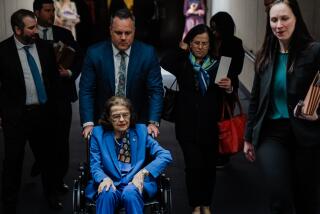Bankrupt Symington Says Wife, Mother Helping Pay His Debts
- Share via
PHOENIX — Gov. Fife Symington, a one-time millionaire who promised to run the state like his real estate empire, told creditors at a bankruptcy hearing Tuesday that he has turned to his wife and mother to help pay his mounting debts.
The two-term Republican underwent a painstaking examination of his finances but offered little new in his first court appearance since filing for personal bankruptcy Sept. 20.
Though he comes from a family that traces its wealth to industrialist Henry Clay Frick, and is married to a wealthy heiress, Symington claimed assets of just $61,000. Other assets, including his townhouse in an exclusive community, are in the name of his wife, Ann.
Symington lost millions in Arizona’s boom-to-bust real estate economy in the late 1980s and early 1990s.
He owes nearly $25 million, including more than $11 million to a consortium of union pension funds that financed a downtown shopping center that has attracted almost no shops.
Attorney Michael Manning, representing the pension funds, questioned Symington for nearly two hours. He probed for details of family trusts that Symington said were established for him by his grandfather.
Manning also asked the governor to confirm figures included in a series of financial statements used to secure bank loans for some of his 13 real estate developments.
Creditors are expected to try to get money from the trusts or Ann Symington, and to try to prove Symington fudged the statements to get loans.
Symington responded vaguely to most questions, saying he could not recall specific details of transactions that in some cases were several years old.
Symington said he has four family trusts that provide about $30,000 a year in interest. He said he also has received portions of the principal on a few occasions in the past.
“I have the ability to request a distribution from the trustees. They are totally independent. Sometimes they say yes, sometimes they say no,” Symington said. He provided no details other than to say that some of the money from the trusts went to pay legal and accounting fees.
More to Read
Inside the business of entertainment
The Wide Shot brings you news, analysis and insights on everything from streaming wars to production — and what it all means for the future.
You may occasionally receive promotional content from the Los Angeles Times.








